- Home
- Jack London
Tales of the Fish Patrol Page 2
Tales of the Fish Patrol Read online
Page 2
Fifteen minutes passed, the Reindeer sinking deeper and deeper, her mainsail flapping in the calm. But from off the Point Pedro shore I saw a dark line form on the water and travel toward us. It was the steady breeze I had been expecting so long. I called to the Chinese and pointed it out. They hailed it with exclamations. Then I pointed to the sail and to the water in the Reindeer , and indicated by signs that when the wind reached the sail, what of the water aboard we would capsize. But they jeered defiantly, for they knew it was in my power to luff the helm and let go the mainsheet, so as to spill the wind and escape damage.
But my mind was made up. I hauled in the mainsheet a foot or two, took a turn with it, and bracing my feet, put my back against the tiller. This left me one hand for the sheet and one for the revolver. The dark line drew nearer, and I could see them looking from me to it and back again with an apprehension they could not successfully conceal. My brain and will and endurance were pitted against theirs, and the problem was which could stand the strain of imminent death the longer and not give in.
Then the wind struck us. The mainsheet tautened with a brisk rattling of the blocks, the boom uplifted, the sail bellied out, and the Reindeer heeled over���over, and over, till the lee-rail went under, the deck went under, the cabin windows went under, and the bay began to pour in over the cockpit rail. So violently had she heeled over, that the men in the cabin had been thrown on top of one another into the lee bunk, where they squirmed and twisted and were washed about, those underneath being perilously near to drowning.
The wind freshened a bit, and the Reindeer went over farther than ever. For the moment I thought she was gone, and I knew that another puff like that and she surely would go. While I pressed her under and debated whether I should give up or not, the Chinese cried for mercy. I think it was the sweetest sound I have ever heard. And then, and not until then, did I luff up and ease out the mainsheet. The Reindeer righted very slowly, and when she was on an even keel was so much awash that I doubted if she could be saved.
But the Chinese scrambled madly into the cockpit and fell to bailing with buckets, pots, pans, and everything they could lay hands on. It was a beautiful sight to see that water flying over the side! And when the Reindeer was high and proud on the water once more, we dashed away with the breeze on our quarter, and at the last possible moment crossed the mud flats and entered the slough.
The spirit of the Chinese was broken, and so docile did they become that ere we made San Rafael they were out with the tow-rope, Yellow Handkerchief at the head of the line. As for George, it was his last trip with the fish patrol. He did not care for that sort of thing, he explained, and he thought a clerkship ashore was good enough for him. And we thought so, too.
II
THE KING OF THE GREEKS
Big Alec had never been captured by the fish patrol. It was his boast that no man could take him alive, and it was his history that of the many men who had tried to take him dead none had succeeded. It was also history that at least two patrolmen who had tried to take him dead had died themselves. Further, no man violated the fish laws more systematically and deliberately than Big Alec.
He was called “Big Alec” because of his gigantic stature. His height was six feet three inches, and he was correspondingly broad-shouldered and deep-chested. He was splendidly muscled and hard as steel, and there were innumerable stories in circulation among the fisher-folk concerning his prodigious strength. He was as bold and dominant of spirit as he was strong of body, and because of this he was widely known by another name, that of “The King of the Greeks.” The fishing population was largely composed of Greeks, and they looked up to him and obeyed him as their chief. And as their chief, he fought their fights for them, saw that they were protected, saved them from the law when they fell into its clutches, and made them stand by one another and himself in time of trouble.
In the old days, the fish patrol had attempted his capture many disastrous times and had finally given it over, so that when the word was out that he was coming to Benicia, I was most anxious to see him.
But I did not have to hunt him up. In his usual bold way, the first thing he did on arriving was to hunt us up. Charley Le Grant and I at the time were under a patrolman named Carmintel, and the three of us were on the Reindeer , preparing for a trip, when Big Alec stepped aboard. Carmintel evidently knew him, for they shook hands in recognition. Big Alec took no notice of Charley or me.
“I’ve come down to fish sturgeon a couple of months,” he said to Carmintel.
His eyes flashed with challenge as he spoke, and we noticed the patrolman’s eyes drop before him.
“That’s all right, Alec,” Carmintel said in a low voice. “I’ll not bother you. Come on into the cabin, and we’ll talk things over,” he added.
When they had gone inside and shut the doors after them, Charley winked with slow deliberation at me. But I was only a youngster, and new to men and the ways of some men, so I did not understand. Nor did Charley explain, though I felt there was something wrong about the business.
Leaving them to their conference, at Charley’s suggestion we boarded our skiff and pulled over to the Old Steamboat Wharf , where Big Alec’s ark was lying. An ark is a house-boat of small though comfortable dimensions, and is as necessary to the Upper Bay fisherman as are nets and boats. We were both curious to see Big Alec’s ark, for history said that it had been the scene of more than one pitched battle, and that it was riddled with bullet-holes.
We found the holes (stopped with wooden plugs and painted over), but there were not so many as I had expected. Charley noted my look of disappointment, and laughed; and then to comfort me he gave an authentic account of one expedition which had descended upon Big Alec’s floating home to capture him, alive preferably, dead if necessary. At the end of half a day’s fighting, the patrolmen had drawn off in wrecked boats, with one of their number killed and three wounded. And when they returned next morning with re��nforcements they found only the mooring-stakes of Big Alec’s ark; the ark itself remained hidden for months in the fastnesses of the Suisun tules.
“But why was he not hanged for murder?” I demanded. “Surely the United States is powerful enough to bring such a man to justice.”
“He gave himself up and stood trial,” Charley answered. “It cost him fifty thousand dollars to win the case, which he did on technicalities and with the aid of the best lawyers in the state. Every Greek fisherman on the river contributed to the sum. Big Alec levied and collected the tax, for all the world like a king. The United States may be all-powerful, my lad, but the fact remains that Big Alec is a king inside the United States, with a country and subjects all his own.”
“But what are you going to do about his fishing for sturgeon? He’s bound to fish with a ‘Chinese line.’”
Charley shrugged his shoulders. “We’ll see what we will see,” he said enigmatically.
Now a “Chinese line” is a cunning device invented by the people whose name it bears. By a simple system of floats, weights, and anchors, thousands of hooks, each on a separate leader, are suspended at a distance of from six inches to a foot above the bottom. The remarkable thing about such a line is the hook. It is barbless, and in place of the barb, the hook is filed long and tapering to a point as sharp as that of a needle. These hooks are only a few inches apart, and when several thousand of them are suspended just above the bottom, like a fringe, for a couple of hundred fathoms, they present a formidable obstacle to the fish that travel along the bottom.
Such a fish is the sturgeon, which goes rooting along like a pig, and indeed is often called “pig-fish.” Pricked by the first hook it touches, the sturgeon gives a startled leap and comes into contact with half a dozen more hooks. Then it threshes about wildly, until it receives hook after hook in its soft flesh; and the hooks, straining from many different angles, hold the luckless fish fast until it is drowned. Because no sturgeon can pass through a Chinese line, the device is called a trap in the fish laws; and becau
se it bids fair to exterminate the sturgeon, it is branded by the fish laws as illegal. And such a line, we were confident, Big Alec intended setting, in open and flagrant violation of the law.
Several days passed after the visit of Big Alec, during which Charley and I kept a sharp watch on him. He towed his ark around the Solano Wharf and into the big bight at Turner’s Shipyard. The bight we knew to be good ground for sturgeon, and there we felt sure the King of the Greeks intended to begin operations. The tide circled like a mill-race in and out of this bight, and made it possible to raise, lower, or set a Chinese line only at slack water. So between the tides Charley and I made it a point for one or the other of us to keep a lookout from the Solano Wharf .
On the fourth day I was lying in the sun behind the stringerpiece of the wharf, when I saw a skiff leave the distant shore and pull out into the bight. In an instant the glasses were at my eyes and I was following every movement of the skiff. There were two men in it, and though it was a good mile away, I made out one of them to be Big Alec; and ere the skiff returned to shore I made out enough more to know that the Greek had set his line.
“Big Alec has a Chinese line out in the bight off Turner’s Shipyard,” Charley Le Grant said that afternoon to Carmintel.
A fleeting expression of annoyance passed over the patrolman’s face, and then he said, “Yes?” in an absent way, and that was all.
Charley bit his lip with suppressed anger and turned on his heel.
“Are you game, my lad?” he said to me later on in the evening, just as we finished washing down the Reindeer’s decks and were preparing to turn in.
A lump came up in my throat, and I could only nod my head.
“Well, then,” and Charley’s eyes glittered in a determined way, “we’ve got to capture Big Alec between us, you and I, and we’ve got to do it in spite of Carmintel. Will you lend a hand?”
“It’s a hard proposition, but we can do it,” he added after a pause.
“Of course we can,” I supplemented enthusiastically.
And then he said, “Of course we can,” and we shook hands on it and went to bed.
But it was no easy task we had set ourselves. In order to convict a man of illegal fishing, it was necessary to catch him in the act with all the evidence of the crime about him���the hooks, the lines, the fish, and the man himself. This meant that we must take Big Alec on the open water, where he could see us coming and prepare for us one of the warm receptions for which he was noted.
“There’s no getting around it,” Charley said one morning. “If we can only get alongside it’s an even toss, and there’s nothing left for us but to try and get alongside. Come on, lad.”
We were in the Columbia River salmon boat, the one we had used against the Chinese shrimp-catchers. Slack water had come, and as we dropped around the end of the Solano Wharf we saw Big Alec at work, running his line and removing the fish.
“Change places,” Charley commanded, “and steer just astern of him as though you’re going into the shipyard.”
I took the tiller, and Charley sat down on a thwart amidships, placing his revolver handily beside him.
“If he begins to shoot,” he cautioned, “get down in the bottom and steer from there, so that nothing more than your hand will be exposed.”
I nodded, and we kept silent after that, the boat slipping gently through the water and Big Alec growing nearer and nearer. We could see him quite plainly, gaffing the sturgeon and throwing them into the boat while his companion ran the line and cleared the hooks as he dropped them back into the water. Nevertheless, we were five hundred yards away when the big fisherman hailed us.
“Here! You! What do you want?” he shouted.
“Keep going,” Charley whispered, “just as though you didn’t hear him.”
The next few moments were very anxious ones. The fisherman was studying us sharply, while we were gliding up on him every second.
“You keep off if you know what’s good for you!” he called out suddenly, as though he had made up his mind as to who and what we were. “If you don’t, I’ll fix you!”
He brought a rifle to his shoulder and trained it on me.
“Now will you keep off?” he demanded.
I could hear Charley groan with disappointment. “Keep off,” he whispered; “it’s all up for this time.”
I put up the tiller and eased the sheet, and the salmon boat ran off five or six points. Big Alec watched us till we were out of range, when he returned to his work.
“You’d better leave Big Alec alone,” Carmintel said, rather sourly, to Charley that night.
“So he’s been complaining to you, has he?” Charley said significantly.
Carmintel flushed painfully. “You’d better leave him alone, I tell you,” he repeated. “He’s a dangerous man, and it won’t pay to fool with him.”
“Yes,” Charley answered softly; “I’ve heard that it pays better to leave him alone.”
This was a direct thrust at Carmintel, and we could see by the expression of his face that it sank home. For it was common knowledge that Big Alec was as willing to bribe as to fight, and that of late years more than one patrolman had handled the fisherman’s money.
“Do you mean to say���” Carmintel began, in a bullying tone.
But Charley cut him off shortly. “I mean to say nothing,” he said. “You heard what I said, and if the cap fits, why���”
He shrugged his shoulders, and Carmintel glowered at him, speechless.
“What we want is imagination,” Charley said to me one day, when we had attempted to creep upon Big Alec in the gray of dawn and had been shot at for our trouble.
And thereafter, and for many days, I cudgelled my brains trying to imagine some possible way by which two men, on an open stretch of water, could capture another who knew how to use a rifle and was never to be found without one. Regularly, every slack water, without slyness, boldly and openly in the broad day, Big Alec was to be seen running his line. And what made it particularly exasperating was the fact that every fisherman, from Benicia to Vallejo , knew that he was successfully defying us. Carmintel also bothered us, for he kept us busy among the shad-fishers of San Pablo , so that we had little time to spare on the King of the Greeks. But Charley’s wife and children lived at Benicia , and we had made the place our headquarters, so that we always returned to it.
“I’ll tell you what we can do,” I said, after several fruitless weeks had passed; “we can wait some slack water till Big Alec has run his line and gone ashore with the fish, and then we can go out and capture the line. It will put him to time and expense to make another, and then we’ll figure to capture that too. If we can’t capture him, we can discourage him, you see.”
Charley saw, and said it wasn’t a bad idea. We watched our chance, and the next low-water slack, after Big Alec had removed the fish from the line and returned ashore, we went out in the salmon boat. We had the bearings of the line from shore marks, and we knew we would have no difficulty in locating it. The first of the flood tide was setting in, when we ran below where we thought the line was stretched and dropped over a fishing-boat anchor. Keeping a short rope to the anchor, so that it barely touched the bottom, we dragged it slowly along until it stuck and the boat fetched up hard and fast.
“We’ve got it,” Charley cried. “Come on and lend a hand to get it in.”
Together we hove up the rope till the anchor came in sight with the sturgeon line caught across one of the flukes. Scores of the murderous-looking hooks flashed into sight as we cleared the anchor, and we had just started to run along the line to the end where we could begin to lift it, when a sharp thud in the boat startled us. We looked about, but saw nothing and returned to our work. An instant later there was a similar sharp thud and the gunwale splintered between Charley’s body and mine.
“That’s remarkably like a bullet, lad,” he said reflectively. “And it’s a long shot Big Alec’s making.”
“And he’s usin
g smokeless powder,” he concluded, after an examination of the mile-distant shore. “That’s why we can’t hear the report.”
I looked at the shore, but could see no sign of Big Alec, who was undoubtedly hidden in some rocky nook with us at his mercy. A third bullet struck the water, glanced, passed singing over our heads, and struck the water again beyond.
“I guess we’d better get out of this,” Charley remarked coolly. “What do you think, lad?”
I thought so, too, and said we didn’t want the line anyway. Whereupon we cast off and hoisted the spritsail. The bullets ceased at once, and we sailed away, unpleasantly confident that Big Alec was laughing at our discomfiture.
And more than that, the next day on the fishing wharf, where we were inspecting nets, he saw fit to laugh and sneer at us, and this before all the fishermen. Charley’s face went black with anger; but beyond promising Big Alec that in the end he would surely land him behind the bars, he controlled himself and said nothing. The King of the Greeks made his boast that no fish patrol had ever taken him or ever could take him, and the fishermen cheered him and said it was true. They grew excited, and it looked like trouble for a while; but Big Alec asserted his kingship and quelled them.
Carmintel also laughed at Charley, and dropped sarcastic remarks, and made it hard for him. But Charley refused to be angered, though he told me in confidence that he intended to capture Big Alec if it took all the rest of his life to accomplish it.
“I don’t know how I’ll do it,” he said, “but do it I will, as sure as I am Charley Le Grant. The idea will come to me at the right and proper time, never fear.”
And at the right time it came, and most unexpectedly. Fully a month had passed, and we were constantly up and down the river, and down and up the bay, with no spare moments to devote to the particular fisherman who ran a Chinese line in the bight of Turner’s Shipyard. We had called in at Selby’s Smelter one afternoon, while on patrol work, when all unknown to us our opportunity happened along. It appeared in the guise of a helpless yacht loaded with seasick people, so we could hardly be expected to recognize it as the opportunity. It was a large sloop-yacht, and it was helpless inasmuch as the trade-wind was blowing half a gale and there were no capable sailors aboard.

 The Son of the Wolf
The Son of the Wolf The Iron Heel
The Iron Heel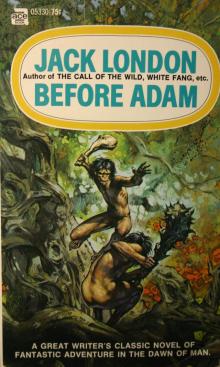 Before Adam
Before Adam Smoke Bellew
Smoke Bellew The Call of the Wild
The Call of the Wild The Valley of the Moon Jack London
The Valley of the Moon Jack London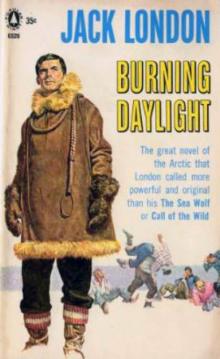 Burning Daylight
Burning Daylight The Sea Wolf
The Sea Wolf White Fang
White Fang A Daughter of the Snows
A Daughter of the Snows The Night-Born
The Night-Born A Son Of The Sun
A Son Of The Sun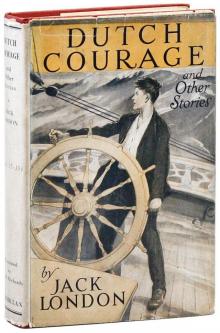 Dutch Courage and Other Stories
Dutch Courage and Other Stories The People of the Abyss
The People of the Abyss Michael, Brother of Jerry
Michael, Brother of Jerry Love of Life, and Other Stories
Love of Life, and Other Stories Lost Face
Lost Face The Road
The Road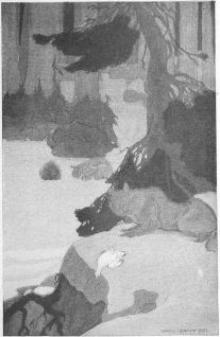 Love of Life
Love of Life The Turtles of Tasman
The Turtles of Tasman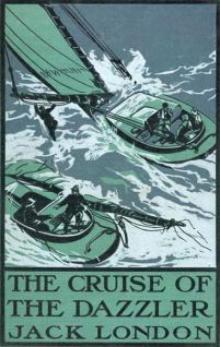 The Cruise of The Dazzler
The Cruise of The Dazzler The Heathen
The Heathen The Scab
The Scab The Faith of Men
The Faith of Men Adventure
Adventure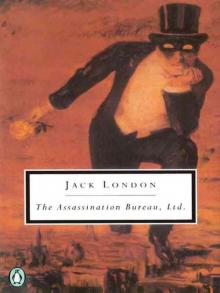 The Assassination Bureau, Ltd.
The Assassination Bureau, Ltd.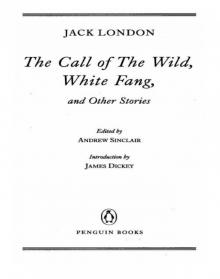 The Call of the Wild, White Fang, and Other Stories
The Call of the Wild, White Fang, and Other Stories The Call of the Wild and Selected Stories
The Call of the Wild and Selected Stories Jerry of the Islands
Jerry of the Islands Hearts of Three
Hearts of Three The House of Pride
The House of Pride Moon-Face and Other Stories
Moon-Face and Other Stories Children of the Frost
Children of the Frost South Sea Tales
South Sea Tales The Strength of the Strong
The Strength of the Strong The Jacket (The Star-Rover)
The Jacket (The Star-Rover) The Little Lady of the Big House
The Little Lady of the Big House John Barleycorn
John Barleycorn ADaugter of Snows
ADaugter of Snows The Mutiny of the Elsinore
The Mutiny of the Elsinore Northland Stories
Northland Stories Tales of the Fish Patrol
Tales of the Fish Patrol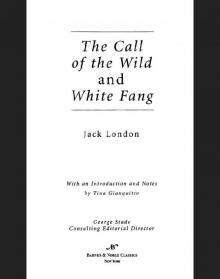 Call of the Wild and White Fang (Barnes & Noble Classics Series)
Call of the Wild and White Fang (Barnes & Noble Classics Series) The Valley of the Moon
The Valley of the Moon The Cruise of the Snark
The Cruise of the Snark The Game
The Game An Autobiography of Jack London
An Autobiography of Jack London